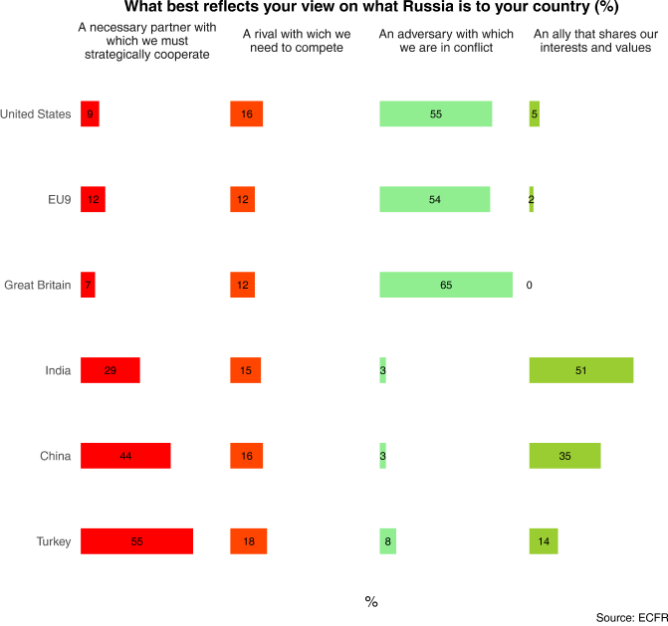Welcome to this edition of the Weekly Political Compass from Teneo’s political risk advisory team!
This week, we are taking a closer look at Greece and the political implications of a recent train crash. Meanwhile, China's growth projection looks on the low side of expectations, while changes at Japan's Central Bank are imminent. Turkey's opposition continues to maneuver ahead of elections, Chile kicks off another constitutional re-write process, and Nigeria's election season continues amid legal challenges from February's vote. Our graph of the week zooms in on divergent global views towards Russia.
Global Snapshot
Greece’s Prime Minister Kyriakos Mitsotakis’ government will come under intense pressure this week over the Tempe train crash on 28 February. Our Director of Research Wolf Piccoli explores the political implications.
Why is the accident causing the government problems?
Poor crisis management and a flawed reading of the public mood in the aftermath of the tragic accident have forced the government to go on the defensive ahead of an impending electoral process. On 5 March, Mitsotakis apologized for the loss of life and the circumstances of the collision in a social media posting. Mitsotakis had previously said that the disaster was “primarily down to a tragic human error,” blaming the stationmaster at Larissa train station.
What are the political signposts ahead?
Before the accident, it was widely believed that Mitsotakis would call elections for 9 April and that this announcement would be made before 10 March. Although this remains a possibility, the PM will want to first see how the public reaction evolves. A possible complication regarding the 9 April date is that it would coincide with the 40-day memorials (a Greek Orthodox tradition) that will be held for those who died in the train crash. An alternative for Mitsotakis is to leave the elections until mid- or late-May.
What to Watch
ASIA PACIFIC
China
At the opening of China’s annual parliament session, the National People’s Congress, outgoing Premier Li Keqiang announced a GDP growth target of 5% for 2023, below last year’s target of 5.5% but well above actual growth of 3% in 2022. The 2023 target is on the low side of expectations, suggesting that after the economy missed last year’s target due to zero-Covid, the new slate of top officials led by incoming premier Li Qiang prefers a target that can be easily met.
Japan
Outgoing Bank of Japan governor Haruhiko Kuroda will chair the final monetary policy committee meeting of his ten-year tenure this week. No policy change is expected when the MPC announces its decision on 10 March. Successor Kazuo Ueda is set to be confirmed in post this week by the Diet ahead of assuming office from 9 April.
South Korea/Japan
Seoul and Tokyo have reached a tentative deal to resolve the thorny issue of wartime forced labor of Korean workers. It paves the way for a major improvement in ties that have been in deep-freeze since 2017. The agreement would initially see certain Korean firms donate to a foundation that would compensate victims, with connected Japanese firms also expected to make voluntary donations. The rapprochement between its two treaty allies in East Asia is being warmly welcomed by Washington, amid shared trilateral concerns over China and North Korea.
EUROPE
EU/US
European Commission President Ursula von der Leyen will head to North America for meetings with the leaders of Canada and the US this week. The encounter with President Joe Biden on 10 March could open the door for more constructive exchanges about the US inflation reduction act. A more structured approach to handling transatlantic differences about green industrial policy – perhaps building on the precedent of the tech cooperation council – would already be positive news. US desires for a more forceful EU positioning vis-à-vis China could provide an additional incentive.
Turkey
The main opposition alliance will meet on 6 March to announce Kemal Kilicdaroglu as its presidential candidate in the 14 May elections. Kilicdaroglu enjoys the backing of his own Republican People’s Party (CHP) and the four smaller parties united under the Nation Alliance umbrella. The Good Party – the second largest party in the Nation Alliance – is also expected to join the meeting after its earlier refusal to endorse the CHP leader as the joint presidential candidate. A compromise was reached, allowing the popular mayors of Ankara and Istanbul to be ‘listed’ as Vice Presidents alongside Kilicardouglu as President.
Estonia
As anticipated, the governing Reform party won the 5 March parliamentary elections and will lead the formation of a new coalition government. According to preliminary results, Reform received 31.2% of votes (37 mandates), leaving the Eurosceptic right-wing Conservative People's Party of Estonia (EKRE) second with 16.1% (17 mandates). The Centre party underperformed and came in third with 15.3% (16 mandates), while a liberal newcomer Estonia200 (E200) won 13.3% (14 mandates). The last two parties that crossed the 5% electoral threshold were the Social Democratic Party (SDP) with 9.3% (9 mandates) and the conservative Fatherland (Isamaa) party with 8.2% (8 mandates).
While Reform has multiple potential coalition partners, its cooperation with E200 and SDP is the most plausible scenario, which would give the new Kallas cabinet a safe majority of 60 deputies in the 101-seat parliament. A new government is expected to be formed by April. Overall, a landslide victory by Reform means policy continuity, including strong and vocal support for Ukraine, conservative fiscal management, a stable tax system, and a greater focus on national defense and green energy.
Lithuania
The Lithuanian Social Democratic Party (LSDP) won the first round of the municipal elections, receiving the greatest share of votes (17.5%) in municipal councils and securing ten mayoral positions. As the largest party with a vast regional network, LSDP usually outperforms in municipal elections. The governing TS-LKD came in second with 16.2% and two mayoralties, which is a relatively good result given its dropping approval ratings. Full results will be known after the second-round vote on 19 March, which will see runoffs for mayoral positions in 34 regions.
LATIN AMERICA
Chile
The 24-member Committee of Experts chosen by Congress to produce the draft text of a new constitution starts work from today, 6 March. The Committee has three months to produce its draft, which will then be taken up by a Constitutional Council whose 50 members will be elected in a referendum scheduled for 7 May. The Council will start its work proper in June and have five months to deliver a final text. The final text will then go to a ratifying referendum scheduled for 17 December. After the experience of the failed rewrite of 2021-22, it seems likely that voters will endorse moderation in both May’s vote for the Council and then in the ensuing referendum. Assuming all goes to plan, Chile will have a new constitution by the end of this year.
MIDDLE EAST AND AFRICA
Nigeria
Even as legal challenges trail the results of the 25 February presidential and National Assembly elections the next round of polls kick off this week, with the governorship and state houses of assembly polls on 11 March. By law, only parties that participated in the elections are allowed to file a legal petition challenging election results, and this must be done within 21 days of the declaration of the result – in the case of the presidential election, this is 22 March. After this, an election petition must be heard, and judgement delivered within 180 days from the date of the filing of the petition.
Ghana
Nearly two weeks after members of parliament (MPs) demanded that the government present details of the Domestic Debt Exchange Program (DDEP) for its approval, a date for the presentation has yet to be concluded. As previously suggested, such a request from parliament could not be ruled out as another stumbling block in the government’s efforts to restructure its domestic and external debts. The latter delays continue to pose a downside risk to the timely approval from the International Monetary Fund (IMF) Executive Board on the Fund’s in-principle USD 3bn loan to Ghana. The latest development can be taken as a foregone conclusion that parliament will, again, demand that any eventual deal reached with external creditors be subject to parliamentary scrutiny.
Graph of the Week
Countries continue to diverge on their views on Russia and the preferred outcome for the war in Ukraine. While a majority of Europeans and Americans see Russia as an adversary, these views are very different in countries such as China, Turkey, and India. The most striking trend is observed in India, where 51 per cent of respondents see Russia as an ally that shares their interests and values. Meanwhile, in China and Turkey, respondents appear to be more pragmatic, with a majority considering Russia a necessary partner with which they must strategically cooperate. A post-Western international order in which multiple centers of power exist appears to be emerging, although the US and China will still outperform the rest.





